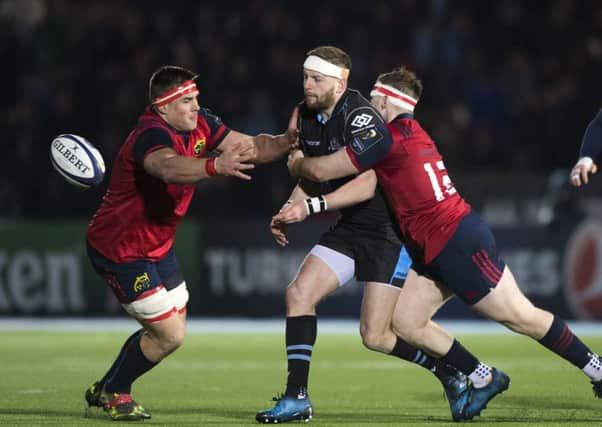Allan Massie: Glasgow must be inventive to claim big win


Away from Thomond Park anyway Munster are playing a very limited game, and playing it supremely well. It’s based on aggressive defence in midfield which denies space to the opposition, equally aggressive counter-rucking, and Conor Murray’s box-kicking. Nobody does that better; his kicks almost always give his team-mates the chance to compete in the air. As for space, Glasgow can usually find that against anyone; they couldn’t last Saturday. A couple of times Finn Russell found a glimmer of light, but it was quickly snuffed out.
Munster are clever, too. If Murray’s box-kicks always give the pursuers a chance to regain possession, Munster are adept at denying that opportunity to the opposition chasing a kick. They don’t engage in anything so vulgar as actual physical obstruction but a player will impede the chaser by slowing up, sometimes ever so slightly, in front of him, thus making it unlikely he can be in a position to challenge for the ball in the air.
Advertisement
Hide AdAdvertisement
Hide AdEver since the World Cup the talk has all been about attacking rugby, and lots of clubs have responded well, some – Leinster for example – quite brilliantly. Munster have reminded us that defence wins matches, too.
Vern Cotter is of course well aware of the importance of defence. This week he explained that Matt Scott had been omitted from the squad for the autumn internationals because of doubt about his positioning in defence. Scott is now back, having been scoring tries with delightful freedom for Gloucester. Fair enough, and very nice too. But scoring has been pretty high in the Aviva Premiership this season, which leaves me wondering if the emphasis on attack hasn’t been accompanied by the neglect of defence.
Leicester’s defence was lamentably feeble when they played Glasgow at Scotstoun, and mostly posted missing when they went to Limerick. It was more resolute in the return match with Munster which suggests that Glasgow will require to be at their most sprightly and inventive if they are to win by any sizeable margin at Welford Road. It’s possible that they may now need a bonus point to qualify for the quarter-final, but not certain that a four-point win will be enough.
In any case they are condemned to an away quarter-final, which means a trip to Dublin, Clermont-Ferrand, Saracens’ Allianz Park or – heaven help us – Thomond Park again. To call any of these assignments tough is an understatement. Still, the luck has been against Glasgow in the Cup his year, for a sad reason that has already been well advertised. So perhaps it’s due to turn. In any case a team that can go to Paris and thump Racing 92 needn’t fear any away match.
Edinburgh, meanwhile, should by the time you read this have secured a home quarter-final tie in the Challenge Cup. This will have been quite an achievement, especially since it has been made possible by beating Harlequins home and away. When the European competitions were re-jigged, I wrote that Edinburgh might benefit from finding themselves playing in the second-grade Cup. Better to win matches there than lose to the big guns in the Champions Cup, and perhaps be hammered.
Well, they have taken their chance boldly and may now well go further. The next problem for Duncan Hodge and his fellow-coaches is to find the means of translating Edinburgh’s Cup form into consistent displays in the Guinness Pro12 League. They are likely to lose fewer players to international duty over the next weeks than some of their competitors; all the more reason why they should start to climb the table.
It’s sad that Willem Nel will miss the Six Nations, all the more so because Alasdair Dickinson is also on the injured list. So the front row that did so well in the World Cup and last year’s Six Nations has been dismantled. It’s true that every country will be without some key players, but most have more strength in depth than we have. So inexperienced props like Zander Fagerson, Allan Dell and Alex Allan will have to do now what one had thought might not be required of them for another couple of years at least. Tough again, but nobody ever said international rugby was meant to be easy.